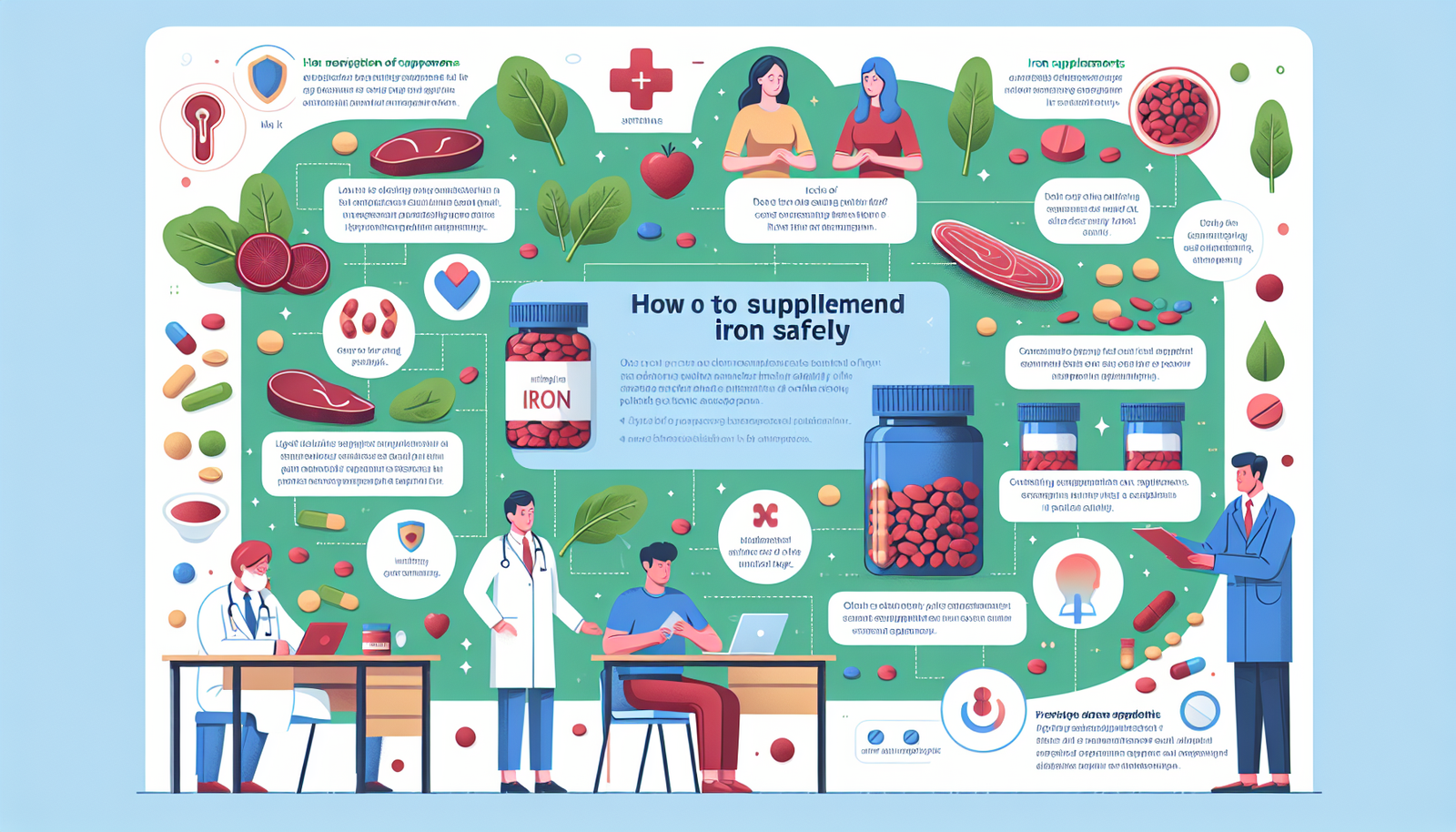
How to Safely Supplement with Iron: Avoiding Deficiency
Iron supplements play a crucial role in addressing iron deficiency, a condition affecting over 25% of the global population. When taken correctly, these supplements can effectively increase iron levels and improve overall health. This post will guide you through the safe use of iron supplements, highlighting the importance of proper dosage and potential side effects. By understanding the right ways to supplement with iron, you can avoid common pitfalls and ensure your body gets the essential nutrients it needs. Read on to learn how to manage your iron intake efficiently and to boost your well-being.
Understanding Iron Deficiency and Supplementation
Iron deficiency is a prevalent health concern affecting millions worldwide. Recognizing the causes and symptoms is essential for effective management. Proper iron supplementation helps restore balance and improve overall health. This section delves into the fundamental aspects of iron deficiency, the role of iron in the body, and how to tailor supplementation to individual needs.
Common Causes and Symptoms of Iron Deficiency
Iron deficiency occurs when the body lacks sufficient iron to produce hemoglobin. This shortfall can result from various factors, including inadequate dietary intake, chronic blood loss, or increased physiological demands during pregnancy. Vegetarians and vegans may also be at risk due to the lower bioavailability of plant-based iron sources.
Symptoms of iron deficiency can vary. Common indicators include fatigue, weakness, pale skin, shortness of breath, and dizziness. In children, it may lead to developmental delays and behavioral issues. Severe deficiency can cause anemia, a condition where the blood lacks enough healthy red blood cells.
Addressing these causes and symptoms is critical. A balanced diet, rich in iron, and regular health check-ups can help in early detection and management.
Importance of Iron in the Body for Optimal Functioning
Iron is a vital mineral that plays a crucial role in various bodily functions. It is a key component of hemoglobin, the molecule responsible for transporting oxygen in the blood. Iron also supports muscle metabolism and the synthesis of neurotransmitters, impacting cognitive functions and energy levels.
Moreover, iron is essential for maintaining a healthy immune system. It helps in the production of white blood cells, which are pivotal in fighting infections. A deficiency can weaken the body’s defense mechanisms, making one more susceptible to illnesses.
Ensuring adequate iron intake is necessary for optimal health. It promotes energy, vitality, and overall well-being.
Identifying Your Personal Iron Supplementation Needs
Understanding personal iron supplementation needs requires a tailored approach. Factors such as age, gender, dietary preferences, and health status all influence iron requirements. For instance, women of childbearing age need more iron than men due to menstrual blood loss.
Consulting healthcare professionals can help in assessing individual needs. Blood tests are often recommended to measure serum ferritin and hemoglobin levels. These tests provide insight into the body’s iron stores and can guide supplementation decisions.
Identifying the right type and dosage of iron supplement is vital. Personalized plans ensure that supplementation is safe and effective, addressing specific deficiencies without causing adverse effects.
Choosing the Right Iron Supplements for Your Health
With various iron supplements available, selecting the right one can be challenging. Understanding the differences between types and knowing how to read labels are crucial steps. This section guides you through the decision-making process, ensuring you make informed choices that align with your health needs.
Types of Iron Supplements: Ferrous vs. Ferric
Iron supplements come in two main forms: ferrous and ferric. Ferrous iron supplements are more commonly used due to their higher bioavailability, meaning the body absorbs them more efficiently. They come in different varieties such as ferrous sulfate, ferrous gluconate, and ferrous fumarate.
Ferric iron supplements, on the other hand, are less easily absorbed. They are often recommended for individuals who experience gastrointestinal side effects with ferrous iron. However, they may require higher doses to achieve the same effect.
Choosing between ferrous and ferric supplements depends on individual tolerance and specific health needs. Consulting with a healthcare provider can help determine the best option.
How to Read and Understand Iron Supplement Labels
Reading and understanding supplement labels can seem daunting. However, it’s a crucial step in selecting the right product. Key information to look for includes the type of iron, dosage per serving, and additional ingredients that may affect absorption.
Labels often list elemental iron content. This refers to the actual amount of iron in the supplement. It’s important to differentiate between the total weight of the compound and the elemental iron to ensure proper dosing.
Some supplements include vitamin C or other nutrients to enhance absorption. Being aware of these additives helps in choosing a supplement that fits dietary restrictions and health goals.
Consultation with Healthcare Professionals Before Supplementing
Consulting with healthcare professionals before starting iron supplements is highly recommended. They can provide valuable insights based on medical history and current health status. A healthcare provider can assess the need for supplementation through blood tests and evaluate potential interactions with other medications.
Professional guidance ensures that the chosen supplement is appropriate and that the dosage is safe. They can also offer advice on lifestyle changes and dietary adjustments to support iron levels.
Personalized recommendations help in preventing complications and achieving optimal health outcomes.
Best Practices for Safe Iron Supplementation
Safe iron supplementation involves understanding recommended dosages, recognizing potential side effects, and regularly monitoring iron levels. This section outlines essential practices to ensure effective and risk-free supplementation, promoting well-being and preventing iron toxicity.
Recommended Dosages for Different Age Groups and Conditions
Iron requirements vary across different age groups and health conditions. Infants and children need adequate iron for growth and development. Adolescents, particularly girls, require increased iron to support rapid growth and menstrual losses.
During pregnancy, women’s iron needs significantly increase to support fetal development and increased blood volume. Adults also have specific requirements based on gender, with men generally needing less than women of reproductive age.
- Infants (7-12 months): 11 mg/day
- Children (1-3 years): 7 mg/day
- Adolescents (14-18 years): Boys 11 mg/day, Girls 15 mg/day
- Pregnant women: 27 mg/day
- Adult men (19-50 years): 8 mg/day
- Adult women (19-50 years): 18 mg/day
Understanding these dosages helps in selecting appropriate supplements and preventing under or over-supplementation.
Potential Side Effects and How to Minimize Risks
While iron supplements are beneficial, they can cause side effects, particularly gastrointestinal issues like constipation, nausea, and stomach upset. Taking the supplement with food can help alleviate these symptoms.
Some individuals may experience allergic reactions or worsening of certain conditions due to excess iron. It’s essential to follow recommended doses and avoid self-prescribing high doses.
Regular monitoring and consultation with healthcare providers can help manage side effects and minimize risks. Adjustments in dosage or switching types of supplements may be necessary for improved tolerance.
Monitoring Your Iron Levels Through Regular Blood Tests
Regular blood tests are crucial in monitoring iron levels and ensuring supplementation effectiveness. These tests typically measure serum ferritin, hemoglobin, and total iron-binding capacity.
Monitoring results guide healthcare providers in adjusting supplementation plans. They can identify imbalances early and help prevent potential health issues related to iron overload or deficiency.
Staying informed about iron levels supports long-term health and well-being, making it an integral part of safe supplementation practices.
Conclusion
Iron supplements are used to treat iron deficiency and anemia. They are available in various forms, including tablets, capsules, and liquid. Side effects may include constipation, nausea, and dark stools. It’s important to follow the recommended dosage to prevent toxicity. Consultation with a healthcare provider is advised, especially for pregnant women and individuals with chronic conditions.
FAQ
What are the benefits of taking iron supplements for anemia?
Iron supplements can increase hemoglobin levels, alleviate fatigue, and improve concentration. They also help restore energy and overall health by addressing iron-deficiency anemia.
How can I determine the right dosage of iron supplements for me?
Consult with a healthcare provider to assess your iron levels through blood tests. This will help in prescribing the appropriate dosage based on individual needs and deficiencies.
Are there any side effects associated with iron supplements?
Some common side effects include nausea, constipation, and stomach upset. Taking supplements with food or switching formulations can often mitigate these issues.
What types of iron supplements are available on the market?
Several options include ferrous sulfate, ferrous gluconate, and ferrous fumarate. Each type has different absorption rates, so consult a healthcare professional to choose the best one for you.
Can I take iron supplements if I have a pre-existing medical condition?
Always consult with your doctor if you have conditions like hemochromatosis or chronic liver disease. Your doctor will guide you on safe supplementation practices.
How long does it usually take for iron supplements to show results?
Most people notice improvements in energy and symptoms within a few weeks. Full restoration of iron levels can take several months, depending on the severity of the deficiency.











